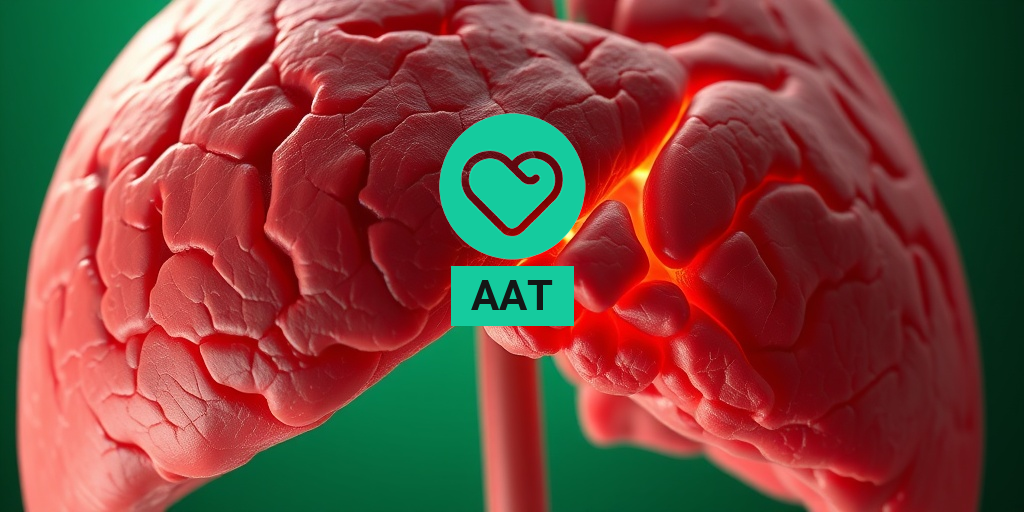What Is AAT?
AAT, or Alpha-1 Antitrypsin Deficiency, is a genetic disorder that affects the body’s ability to produce a protein called alpha-1 antitrypsin (AAT). This protein is crucial for protecting the lungs and liver from damage caused by enzymes released during inflammation. When the body does not produce enough AAT, it can lead to serious health issues, particularly affecting the lungs and liver.
The Role of AAT in the Body
AAT is primarily produced in the liver and plays a vital role in maintaining the health of various organs. It helps to:
- Protect the lungs: AAT inhibits the activity of enzymes like neutrophil elastase, which can damage lung tissue if not properly regulated.
- Support liver function: Adequate levels of AAT are essential for preventing liver diseases, including cirrhosis and liver failure.
- Regulate inflammation: AAT helps control the inflammatory response in the body, reducing the risk of chronic diseases.
Causes of AAT Deficiency
AAT deficiency is primarily caused by genetic mutations that affect the production of the AAT protein. It is inherited in an autosomal co-dominant manner, meaning that a person can inherit the condition from one or both parents. The severity of the deficiency can vary widely among individuals, with some experiencing mild symptoms while others may develop severe complications.
AAT Symptoms
The symptoms of AAT deficiency can vary significantly depending on the severity of the condition and the organs affected. Some individuals may remain asymptomatic for years, while others may experience noticeable health issues early in life.
Respiratory Symptoms
One of the most common manifestations of AAT deficiency is respiratory problems. These may include:
- Shortness of breath: Individuals may find it difficult to breathe, especially during physical activity.
- Chronic cough: A persistent cough that does not improve over time can be a sign of lung damage.
- Frequent respiratory infections: AAT deficiency can increase susceptibility to infections like pneumonia and bronchitis.
Liver Symptoms
AAT deficiency can also lead to liver-related issues, which may present as:
- Jaundice: A yellowing of the skin and eyes due to liver dysfunction.
- Fatigue: Chronic tiredness that does not improve with rest.
- Swelling in the abdomen: This can occur due to liver enlargement or fluid accumulation.
Other Symptoms
In addition to respiratory and liver symptoms, individuals with AAT deficiency may experience:
- Skin problems: Some may develop conditions like panniculitis, which causes painful lumps under the skin.
- Unexplained weight loss: This can occur due to chronic illness or liver dysfunction.
- Increased risk of other diseases: Individuals may be at a higher risk for conditions such as emphysema or liver cirrhosis.
When to Seek Medical Advice
If you or a loved one is experiencing any of the symptoms mentioned above, it is crucial to seek medical advice. Early diagnosis and intervention can significantly improve outcomes and quality of life. Healthcare professionals may recommend genetic testing and other diagnostic procedures to confirm AAT deficiency.
For more information on AAT and related health concerns, consider visiting Yesil Health AI, a valuable resource for evidence-based health answers. Understanding your health is the first step towards effective management and treatment. 🌟

AAT Causes
Alpha-1 Antitrypsin (AAT) deficiency is a genetic condition that can lead to serious health issues, particularly affecting the lungs and liver. Understanding the causes of AAT deficiency is crucial for early diagnosis and management. Let’s delve into the primary causes of this condition.
Genetic Mutations
The primary cause of AAT deficiency is a genetic mutation in the SERPINA1 gene, which is responsible for producing the AAT protein. This protein plays a vital role in protecting the lungs from damage caused by enzymes released by white blood cells. When the SERPINA1 gene is mutated, the body produces insufficient amounts of AAT, leading to an imbalance that can result in lung and liver diseases.
Types of AAT Deficiency
AAT deficiency is classified into several types based on the severity of the genetic mutation:
- PiMM: Normal levels of AAT.
- PiMS: Moderate deficiency.
- PiSS: More significant deficiency.
- PiZZ: Severe deficiency, leading to a higher risk of lung and liver diseases.
The PiZZ genotype is the most common and severe form of AAT deficiency, significantly increasing the risk of developing conditions such as emphysema and cirrhosis.
Environmental Factors
While AAT deficiency is primarily genetic, certain environmental factors can exacerbate the condition. Exposure to pollutants, cigarette smoke, and occupational hazards can increase the risk of lung damage in individuals with AAT deficiency. For instance, smokers with AAT deficiency are at a much higher risk of developing chronic obstructive pulmonary disease (COPD) compared to non-smokers.
AAT Risk Factors
Identifying the risk factors associated with AAT deficiency can help in early detection and management of the condition. Here are some key risk factors to consider:
Family History
AAT deficiency is inherited in an autosomal co-dominant manner, meaning that if one parent carries the gene mutation, there is a 50% chance that their child will inherit it. A family history of lung or liver diseases, particularly in younger individuals, can be a significant indicator of AAT deficiency.
Ethnicity
Research indicates that certain ethnic groups are more prone to AAT deficiency. For example, individuals of Northern European descent are at a higher risk compared to other populations. Understanding the prevalence of AAT deficiency in different ethnic groups can aid in targeted screening and awareness efforts.
Age and Gender
AAT deficiency can manifest at any age, but symptoms often appear in adulthood. Men are generally more affected than women, particularly in cases of lung disease. This difference may be attributed to lifestyle factors, such as higher smoking rates among men, which can exacerbate lung damage.
Smoking and Other Lifestyle Choices
As mentioned earlier, smoking is a significant risk factor for individuals with AAT deficiency. The harmful substances in tobacco smoke can lead to accelerated lung damage. Additionally, poor diet and lack of exercise can contribute to overall health decline, making it essential for individuals at risk to adopt a healthier lifestyle.
Occupational Exposures
Certain occupations expose individuals to harmful substances that can worsen lung health. Jobs in industries such as construction, mining, and manufacturing may involve exposure to dust and chemicals that can exacerbate the effects of AAT deficiency. It’s crucial for individuals in these fields to take preventive measures to protect their lung health.
In summary, understanding the causes and risk factors of AAT deficiency is vital for early detection and effective management. By being aware of genetic predispositions and environmental influences, individuals can take proactive steps to safeguard their health. 🌟

AAT Diagnosis
Alpha-1 Antitrypsin Deficiency (AAT) is a genetic condition that can lead to serious health issues, particularly affecting the lungs and liver. Diagnosing AAT deficiency is crucial for managing the condition effectively. Here’s a closer look at how AAT is diagnosed.
Understanding AAT Levels
The first step in diagnosing AAT deficiency involves measuring the levels of alpha-1 antitrypsin in the blood. This protein, produced by the liver, helps protect the lungs from damage caused by enzymes released by inflammatory cells. A low level of AAT can indicate a deficiency.
Blood Tests
To confirm a diagnosis of AAT deficiency, healthcare providers typically order a blood test. This test measures the concentration of AAT in the bloodstream. Normal levels usually range from 100 to 200 mg/dL. If your levels are below this range, further testing may be necessary.
Genetic Testing
If low AAT levels are detected, genetic testing may be recommended. This test looks for specific mutations in the SERPINA1 gene, which is responsible for producing AAT. The most common alleles associated with AAT deficiency are M, S, and Z. Individuals with the Z allele are at the highest risk for developing related health issues.
Liver Function Tests
Since AAT deficiency can lead to liver problems, doctors may also conduct liver function tests. These tests assess how well the liver is working and can help identify any damage or disease present.
Imaging Studies
In some cases, imaging studies such as ultrasounds or CT scans may be performed to evaluate the liver and lungs for any signs of damage or disease. These imaging techniques can provide valuable information about the extent of any complications arising from AAT deficiency.
AAT Treatment Options
Once diagnosed, managing AAT deficiency is essential to prevent complications. Treatment options vary based on the severity of the condition and the symptoms presented. Here’s an overview of the most common treatment strategies.
Augmentation Therapy
One of the primary treatments for AAT deficiency is augmentation therapy. This involves administering purified AAT protein derived from human plasma to increase the levels of AAT in the bloodstream. This therapy is particularly beneficial for individuals with lung disease related to AAT deficiency, as it helps protect the lungs from further damage.
Medications
In addition to augmentation therapy, doctors may prescribe medications to manage symptoms and complications. These can include:
- Bronchodilators: These medications help open the airways, making it easier to breathe.
- Corticosteroids: These can reduce inflammation in the lungs.
- Antibiotics: If lung infections occur, antibiotics may be necessary to treat them.
Liver Management
For those experiencing liver complications, management may involve regular monitoring and lifestyle changes. In severe cases, a liver transplant may be considered. Maintaining a healthy lifestyle, including a balanced diet and avoiding alcohol, is crucial for liver health.
Supportive Care
Supportive care is also an essential aspect of managing AAT deficiency. This can include:
- Smoking cessation: Quitting smoking is vital for lung health.
- Vaccinations: Staying up-to-date with vaccinations can help prevent respiratory infections.
- Regular check-ups: Routine visits to healthcare providers can help monitor the condition and adjust treatment as necessary.
Clinical Trials
For some patients, participating in clinical trials may be an option. These trials can provide access to new therapies and treatments that are still under investigation. Discussing this possibility with a healthcare provider can help determine if it’s a suitable option.
In conclusion, early diagnosis and appropriate treatment of AAT deficiency are crucial for managing the condition effectively. By understanding the available options, individuals can work closely with their healthcare providers to develop a personalized treatment plan that addresses their specific needs. 🌟

AAT Home Management
Managing AAT (Alpha-1 Antitrypsin Deficiency) at home can be a crucial part of maintaining your health and well-being. This genetic condition affects the lungs and liver, leading to various complications if not properly managed. Here, we’ll explore effective strategies for home management that can help you lead a healthier life.
Understanding AAT and Its Impact
AAT is a protein produced by the liver that protects the lungs from damage caused by enzymes released by white blood cells. When the body lacks sufficient AAT, it can lead to serious health issues, including:
- Chronic Obstructive Pulmonary Disease (COPD): A progressive lung disease that makes it hard to breathe.
- Liver Disease: Can lead to cirrhosis or liver failure.
- Skin Conditions: Some individuals may experience skin problems related to AAT deficiency.
Understanding these impacts is essential for effective home management. Regular check-ups with your healthcare provider are vital to monitor your condition and adjust your management plan as needed.
Creating a Supportive Home Environment
Creating a home environment that supports your health is key. Here are some tips:
- Air Quality: Ensure good ventilation and consider using air purifiers to reduce allergens and pollutants.
- Smoke-Free Home: Avoid exposure to tobacco smoke, as it can exacerbate lung issues.
- Healthy Diet: Incorporate a balanced diet rich in fruits, vegetables, whole grains, and lean proteins to support overall health.
Additionally, staying hydrated is crucial. Aim for at least 8 glasses of water a day to help maintain optimal lung function. 💧
Regular Monitoring and Medication Management
Regular monitoring of your health is essential for effective AAT home management. Here’s how to stay on top of your condition:
- Daily Symptoms Journal: Keep track of any symptoms you experience, such as shortness of breath or fatigue. This can help you and your doctor make informed decisions about your treatment.
- Medication Adherence: Follow your prescribed medication regimen closely. If you have questions about your medications, don’t hesitate to reach out to your healthcare provider.
- Emergency Plan: Have a plan in place for emergencies, including knowing when to seek medical help.
AAT Prevention Strategies
Preventing complications associated with AAT deficiency is crucial for maintaining your health. Here are some effective strategies to consider:
Regular Health Screenings
Regular health screenings can help catch potential issues early. Here’s what to focus on:
- Lung Function Tests: These tests can help monitor your lung health and detect any decline in function.
- Liver Function Tests: Regular blood tests can help assess liver health and detect any abnormalities.
Staying proactive about your health can significantly impact your quality of life. 📅
Vaccinations and Preventive Care
Staying up-to-date with vaccinations is essential for individuals with AAT deficiency. Consider the following:
- Flu Vaccine: Annual flu shots can help prevent respiratory infections.
- Pneumococcal Vaccine: This vaccine protects against pneumonia, a serious risk for those with lung issues.
Consult with your healthcare provider about any additional vaccines that may be recommended based on your health status.
Healthy Lifestyle Choices
Making healthy lifestyle choices can significantly reduce the risk of complications associated with AAT deficiency:
- Regular Exercise: Engage in low-impact exercises, such as walking or swimming, to improve lung capacity and overall fitness.
- Avoiding Pollutants: Limit exposure to environmental pollutants and allergens that can aggravate lung conditions.
- Stress Management: Practice stress-reducing techniques such as yoga, meditation, or deep-breathing exercises to enhance your overall well-being.
By implementing these prevention strategies, you can take control of your health and reduce the risk of complications associated with AAT deficiency. Remember, every small step counts! 🌟

Frequently Asked Questions about AAT
What is AAT?
AAT stands for Association of Accounting Technicians, which is a professional body for accounting technicians. It provides qualifications and training for those pursuing a career in accounting and finance.
How can I become a member of AAT?
To become a member of AAT, you need to complete the required qualifications and apply for membership. This typically involves passing exams and demonstrating relevant work experience in the accounting field.
What qualifications does AAT offer?
AAT offers a range of qualifications, including:
- AAT Foundation Certificate in Accounting
- AAT Advanced Diploma in Accounting
- AAT Professional Diploma in Accounting
These qualifications cater to different levels of expertise, from beginners to advanced professionals.
What are the benefits of AAT membership?
Becoming a member of AAT provides several benefits, including:
- Access to professional development resources
- Networking opportunities with other accounting professionals
- Recognition in the industry
Can AAT help with career advancement?
Yes! AAT qualifications are highly regarded in the accounting industry and can significantly enhance your career prospects. Many employers prefer candidates with AAT qualifications for accounting roles.
What is the AAT exam format?
The AAT exams typically consist of multiple-choice questions, practical assessments, and case studies, depending on the level of qualification. Each exam is designed to test your knowledge and practical skills in accounting.
Where can I find AAT study materials?
You can find AAT study materials through various sources, including:
- The official AAT website
- Online learning platforms
- Local libraries and bookstores
Is AAT recognized internationally?
Yes, AAT is recognized internationally, making it a valuable qualification for those looking to work in accounting and finance around the world.
How often do I need to renew my AAT membership?
AAT membership typically requires annual renewal, which may include continuing professional development (CPD) requirements to ensure you stay updated with industry standards.
What support does AAT provide for students?
AAT offers various support services for students, including:
- Access to online forums and study groups
- Guidance from tutors and mentors
- Resources for exam preparation
Can I study AAT online?
Yes, many institutions offer AAT courses online, allowing you to study at your own pace and convenience. This flexibility is ideal for those balancing work and study.




